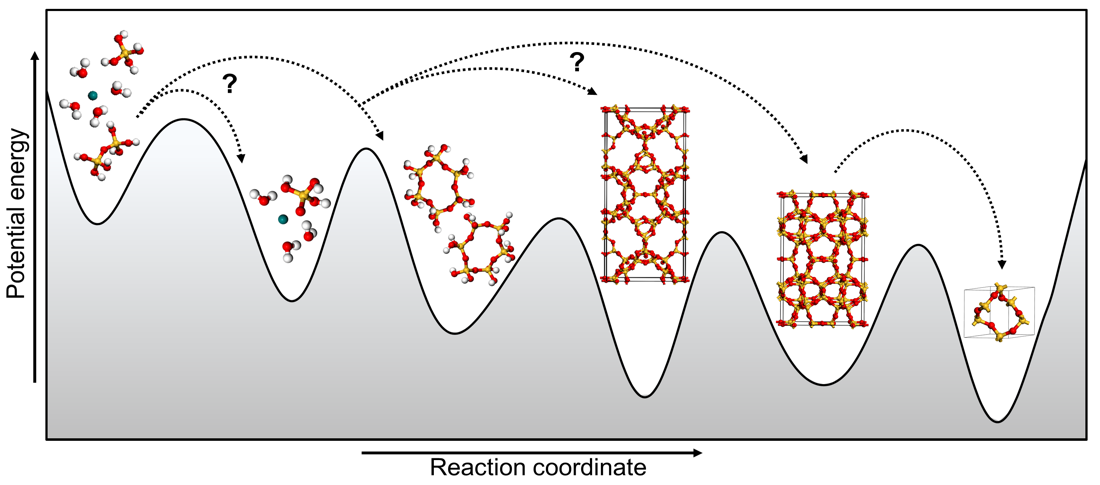Ab Initio Modelling of Real-world Catalysts Accelerated by Machine Learning Potentials.
Contact person and project leader: Dr. Lukáš Grajciar, lukas.grajciar@natur.cuni.cz, 0000-0001-9464-7769 (ORCID), H-1266-2015 (Publons)
Webpage of the project leader: http://physchem.cz/people/dr-lukas-grajciar/
Research group(s): Charles University Center for Advanced Materials & Nanomaterials Modelling
Leader of the research group(s): Prof. Petr Nachtigall
Web page of the research group(s): http://www.cucam.cuni.cz
http://physchem.cz/research/nanomaterials-modeling/
Project summary:
Heterogeneous catalysis is heavily used in industry and is pivotal in our efforts to make chemical processes greener and more efficient. Direct experimental identification of the catalytically active sites and reaction mechanisms in heterogenous catalysts is challenging, hindering the ability to design catalysts for particular application [1]. Our recent work [2-3] on microporous zeolitic catalysts using biased ab initio molecular dynamics highlighted the fluctional nature of the catalyst surface, challenging the conventional view of these catalysts as being static under solvation. However, achieving such computational results for realistic catalytic systems is either extremely costly [4-5] using ab initio treatments only or is plainly unattainable due to unsuitability/unreliability of available empirical force fields.
Therefore, in this project, the goal is to contribute to establishing a computational protocol for the description of heterogeneous catalysis under realistic conditions. The envisioned protocol is expected to retain the first principles accuracy essential for a reliable description of bond breaking/formation while decreasing costs by employing neural networks-based force fields. The capabilities of the protocol will be demonstrated for (catalytic) processes at liquid-solid interface in an important class of microporous heterogeneous catalysts, the zeolites [6].

Figure 1: A simplified zeolite synthesis pathway through the configurational space.
Profile of an ideal candidate:
Required - MSc. or equivalent in Chemistry, Physics or a related field; good knowledge of English; experience in programming (ideally Python or similar)
Advantageous, but not required - background in Statistics, Statistical Mechanics and Quantum Chemistry/Physics; experience with molecular simulations and Linux.
Relevant publications of the project leader:
[1] Grajciar, L., Heard, C.J., Bondarenko, A.A., Polynski, M.V., Meeprasert, J., Pidko, E.A., Nachtigall, P. (2018): Towards Operando Computational Modeling in Heterogeneous Catalysis. In: Chemical Society Reviews (IF=40.1), 22, 8307-8348
[2] Heard, C. J., Grajciar, L., Nachtigall, P., (2019): The Effect of Water on the Validity of Loewenstein’s Rule. In: Chemical Science (IF=9.063), 10, 5705-5711.
[3] Heard, C.J., Grajciar, L., Rice, C.M., Pugh, S.M., Nachtigall, P., Ashbrook, S., Morris, R.E. (2019): Fast Room Temperature Lability of Aluminosilicate Zeolites. In: Nature Communications (IF=11.9) doi: 10.1038/s41467-019-12752-y.
[4] Grajciar, L. (2015): Low-memory Iterative Density Fitting. In: Journal of Computational Chemistry (IF=3.2), 36, 1521-1535. Cover article of the Issue 20.
[5] Lazarski, R., Burow, A. M., Grajciar, L., Sierka, M., (2016): Density Functional Theory for Molecular and Periodic Systems Using Density Fitting and Continuous Fast Multipole Method: Analytical Gradients. In: Journal of Computational Chemistry (IF=3.2), 37, 2518-2526.
[6] Roth, W. J., Nachtigall, P., Morris, R. E., Wheatley, P. S., Ashbrook, S. E., Seymour, V., Chlubna, P., Grajciar, L., Polozij, M., Zukal, A., Shvets, O., Cejka, J. (2013): A Family of Complex Zeolites with Controlled Pore Size Prepared Through a ‘top down’ Method. In: Nature Chemistry (IF=26.2), 5, 628-633.
Current research grants of the project leader:
Junior group leader research project Primus/20/SCI/004 of Charles University (two postdocs and one PhD student) - “Computational catalysis goes operando”, principal investigator, total budget € 250.000, (2020-2022)
Current research grants of the group:
Charles University Center for Advanced Materials, supported my Ministry of Education, Youth and Sports of the Czech Republic within “Excellent Research Teams” framework, project No. CZ.02.1.01/0.0/0.0/15_003/0000417 (2017-2022)
Czech-Bavarian Project – Design Principles for Structural Materials – Synthesis, Characterization, Application (2017-2020)
“ Stability of zeolites under extreme conditions: hot liquid water and steam”, GA ČR 19-21534S (2019-2021)